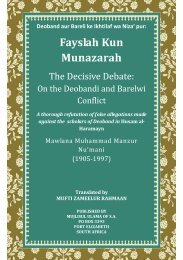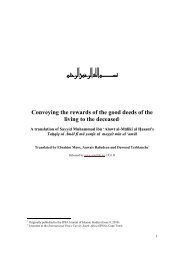al_etidaal_gn
al_etidaal_gn
al_etidaal_gn
Create successful ePaper yourself
Turn your PDF publications into a flip-book with our unique Google optimized e-Paper software.
— not in the strength of Imaan, neither in correctness of action, nor in knowledge of<br />
the language of the Quran, nor in the light of intimacy with Allah. How can we ever<br />
think of comparing our intellectu<strong>al</strong> prowess with the high position of Rasulullah<br />
(S<strong>al</strong>l<strong>al</strong>lahu Alayhi Was<strong>al</strong>lam) which was even inaccessible for the rest of the<br />
Prophets?<br />
Allama Ibn Jowzi enumerated in his book T<strong>al</strong>bees-i-Iblees <strong>al</strong>l those ways in which<br />
shaytaan used human intelligence, understanding and their keeness for investigation<br />
to attack this Ummah. He firther proved that the human is able to acquire divine<br />
knowledge only in part and hence it is incumbent on him to refer to the Shariat.<br />
Otherwise they will land in the deep caverns of error and deviation from truth.<br />
The discussion by Ibn Jowzi is quite an interesting one and well worth studying.<br />
Should you wish you will be well advised to read it.<br />
Apart from <strong>al</strong>l that has been said, there is another point to which attention should be<br />
given. ft is this: Whether the differences we have in opinion is of the praiseworthy<br />
type or the bad type, it is completely against Islamic teachings to exceed the bounds<br />
of decency and to de<strong>al</strong> with opponents in harsh and immoderate ways. The Quran<br />
states:<br />
“Allow not your hatred of people, who once prevented your entrance to the Holy<br />
Mosque to induce you to transgress beyond justice.” (5. 2)<br />
Just think! In this we de<strong>al</strong> with opposition from among the idolators. Think how<br />
severe was their opposition to Islam! Yet in spite of that the Muslims are warned and<br />
prohibited from excesses and injustice in ret<strong>al</strong>iation. What I am saying is not that<br />
there is no differences of opinion or that there are no differences in points of view on<br />
ma’saail, or that there are no points of dispute. These things have <strong>al</strong>ways been and<br />
<strong>al</strong>ways will be with us. The disputes are of both the praiseworthy as well as<br />
blameworthy types. But is there anything for which we do not have the opinions,<br />
actions and practice of our predecessors as a ray of guiding light? These differences<br />
should be kept within the limits of decency. If you wish to know the stories of mutu<strong>al</strong><br />
differences, then look up the disputes between the Sahabah (Radi<strong>al</strong>laht anhum). You<br />
will find that even in their fighting, they accomplished this teaching to the full. I now<br />
want to bring to your attention some of these incidents. But before I do that let me<br />
first point out one very important matter as a major guiding principle to bear in mind<br />
<strong>al</strong>ways.<br />
The Sahabah (Radi<strong>al</strong>lahu anhum)<br />
The Sahabah (Radi<strong>al</strong>lahu anhum) were human and they <strong>al</strong>so committed<br />
transgressions. In affairs of government and of state they <strong>al</strong>so had differences and<br />
occassions arose when even battles were fought. Although these incidents are not<br />
befitting to their high esteem and elevated positions, they still serve as guiding<br />
Al- Eti’da<strong>al</strong> Fi Maraatibur- Rija<strong>al</strong> 174




